- Home
- Mordecai Richler
Son of a Smaller Hero Page 11
Son of a Smaller Hero Read online
Page 11
Why did he resent me taking him to school, and picking him up afterwards? Do you know how many accidents there are every day? Leah coughed softly, and sought a cooler spot on the pillow. 1925. Yes, that was the year. A stranger began to appear in our house. A dark, broad-shouldered man with bushy eyebrows. After having introduced himself as the son of a scribe – him, the son of a scribe! – he sat in the corner there like the cat’s meow on Friday evenings never asking questions – no, not him – or joining in the readings. You should have seen Melech in these days, Noah. Sitting there with his shoes unshined and – pheh – his fly unbuttoned. Paw only allowed him in the house out of pity, Noah. Melech sent his sons to study with Paw – but that had nothing to do with it. Paw warn’t flattered by Melech’s attentions. Times were hard, Paw needed pupils. But Melech knew what kind of – Paw was welcomed as a great man in Melech’s home. Why not? But Paw wasn’t fooled. You know what he said to me? “Who did Rabbi Levi Yitzhok love more than the peasants?” Oi, I laughed.
Listen, Noah, when Paw visited Melech he always brought me with him, and when Melech visited Paw he always brought that man – his eldest son – with him.
“This match was made in heaven,” Paw said.
“To marry my son into such a family,” Melech said, “is the greatest dowry that I could wish.”
Leah twisted in her sleep and sobbed quietly. Remember your first quarrel with Melech, Noah? Only a boy, yes, but you told that old – that old – that – who-knows-what … More brains than all of them put together, all of them, lying around like I don’t know what on Saturday afternoons with their shoes off and picking their noses and snoring and their feet smelling and telling each other filthy jokes they heard in the Gaiety probably and all frightened to death of their father; well my Noah isn’t!
Noah, in the months before the wedding I wrote him long poetical letters about love and the beauty of the soul. It’s like a burn remembering those letters. You can’t imagine.… The boys in Panofsky’s teased him.
“Well, Wolfy, it’s like any other bit of machinery. Comes the day in every man’s life when he’s got to put it into operation.”
Noah, Noah. He couldn’t understand why – the two of us living only four blocks apart – I wrote him those letters. When we were together I read to him from the novels of Sir Walter Scott and the poems of Lord Byron. Every night I cried myself to sleep.… Every night. Our marriage wasn’t consummated for several months. I … When Melech found out he spoke to Paw and Paw spoke to me and within a short time I was pregnant with you, boyele.
A wild outburst of sobbing followed, her heart thumped very quickly. My confinement was so hard: Night after night I sat alone here in this cold drab flat taking novels like pills while that man played cards around the corner at Panofsky’s. Who heard my weeping? Who? But as I got bigger I knew that I was going to have you, tzatzgele, and that you would be a rabbi or a great surgeon or a poet. A Byron.
The night you were born, Noah, that man was at the movies. He didn’t like hospitals. Leah seized the pillow and crushed her red and swollen face into it with a passion that surprised even her. Later Paw – who was old and ailing and no longer with disciples – came to stay with us. That was during the depression, Noah. I had to use all my wits in order to make ends meet. Do you think that man would cancel the subscriptions to his magazines? “I’d buy them on the news-stands, anyway. This way it’s cheaper.” So I walked twenty blocks in the freezing cold rather than spend a rotten nickel on a streetcar ticket. I begged money from Harry. Greenbaum gave me piecework to do at home. Other old friends contributed a dollar here and a grocery order there. Max – who had just gone into business – gave me his books to do. Listen, Noah, I swore up and down that you would have everything. Somehow I managed to take out that small insurance policy for you. Remember when Friedman said: “If you find fifty cents a week too difficult you can switch to a smaller policy.” Oh no. Such mothers come a dime a dozen – not that I’m asking for thanks. Aren’t you thanks enough? Listen, I sometimes went without food rather than let the insurance payments lapse. The only person who I wouldn’t accept help from was Melech.
Nu, if Paw had a stroke soon after he moved in with us and had to stay in bed after that was it his fault? Who passed the following few nights on a cot in Paw’s room, me or that man? All right, so I didn’t go back to that man’s bed for a few weeks. Paw was sick.
“Why is it Harry doesn’t come for a visit?”
“I don’t know, Paw. I guess he’s got exams or something.”
“Yes. Exams. Felder still comes. He came to ask me for advice yesterday. But the others …”
“It’s a depression, Paw. Everybody’s got troubles.…”
“Money – no money – is not troubles.”
“Yes, Paw.”
“A word from me, Leah, used to be something for them. For all of them. But in the last years – you know what? – the children laughed in the street when I passed.”
“People stop me in the street every day, Paw. They all want to know how you’re doing.”
“Lie to an old man.”
Melech – don’t you worry – came often, Noah. But Paw saw that he was ignorant and he was disgusted by him.
“Remember, Melech. Your children must come to God out of love. Otherwise, their prayers are dead prayers. And are not heard in heaven.”
Melech listened, but he said nothing. He didn’t agree. But he had a tremendous respect for Paw, I’ll tell you. Paw was a Zaddik. Years, years, years. Listen, Noah, in his last days Paw wasted away and turned grey and was delirious almost always. He saw things. He talked with the Baal Shem Tob and Rabbi Levi Yitzhok and Sheneir Zalman and Rabbi Dob Baer. Between you and Paw – boyele – I hardly slept a wink.
“When the Baal Shem Tob – well, when he died – there was a light … a kind of light. If – I’m not saying – but if you should see anything, would you … I mean don’t be ashamed to say.…”
And for six long days, oh God, he watched me, his eyes full of expectations.
“Do you think … I mean will many come to the funeral?”
“You’re not going to die, Paw. You’ll get well. But not a Jew in Montreal would stay away from your funeral.”
Harry said that I was killing myself. Paw, he said, should be sent to a hospital. But I wouldn’t hear of it.
“Leah – Leah, did you … if – if there is a light …”
“Yes, Paw, there is a light.”
“You see it?”
“I see it.”
“Can you … I mean … Describe it. Quick!”
Years. An unending road of years, each one harder than the last.
“Maw? Are you sleeping? Maw …”
Leah struggled with the many, heavy seas. She was borne upwards, conscious, unwillingly. “Noah, it’s really you. How lovely! Let me look at you, boyele.”
He was astonished to see how she had altered. Her hair was greying, her cheeks were hollow. Her eyes were red and swollen and lacked their former vitality. He noticed that her bed had been moved into the living-room. “Maw, you’ve been crying,” he said. He kissed her forehead. “Your father used to say do not make a woman weep. God counts her tears. Come, get dressed. I’ll take you for a walk.”
“No, Noah.” She smiled. “You should have warned me that you were coming. I would have fixed my hair. I bet you think your mother is old and ugly.”
“Not at all, Maw. You look fine.” He took her hands in his. “You …”
“Go on. I can see from the way you look at me.”
Leah had a long, melancholy face with yearning eyes and a severe mouth. In this room, among her possessions, her manner was subdued. But Noah remembered that when he had used to take her out or when she had sat in the chair at meetings she had been quickly transformed into an eager, vital woman. Once, when Noah had taken her to a movie, she had said to him: “I feel so young. I’ll bet if we met any of your friends on the street they’d take me for your sister or som
ething.”
“How are things with the Ladies’ Auxiliary, Maw?”
“I don’t go any more.”
“And Mizrachi?”
“I’ve given up enough of my energy to them already.”
Noah felt like weeping. He pressed her hand. It was rough and cracked and warm. She is no longer Jacob the Zaddik’s daughter, he thought sadly. Jacob is dead. He looked at her tenderly – but could think of nothing appropriate to say.
“Come closer,” Leah said.
She kissed him hungrily and he felt poor in that he could only return the gesture feebly and with fear. “Maw, I didn’t even bring you anything. Flowers or …”
“You came yourself. That’s a present.”
“Are you sick, Maw?”
“Nothing. Harry says I’ll be up and around before you know it. I have to lie down for a couple of hours every afternoon, that’s all. I get headaches and it hurts me – I think it’s my blood-pressure. Look, as long as you’re all right. My life is finished. I …” She laughed emptily. “There I go again. You’ve got your own life to lead. I’m not going to make myself a weight on your back. So, how do you like college?”
“Not very much, Maw. I’m thinking of leaving.”
“Leaving. Why?”
“I’m pretty restless.”
“Restless, he’s telling me. Don’t I remember? You were in such a hurry to be born.” She smiled wanly. You’re no Adler, she thought. When I look at you I can feel what my father, may he rest in peace, was like as a young man. “You think that man – your father, I mean – cared if you went to school? You could have been a truck driver like him.” She laughed. “Never mind. But you look thin, boyele. Do you eat enough? Where do you stay?”
Her voice came to him dimly, like weeping from another room. Yet she was strong, clever, too. He knew that. Why didn’t she reproach him?
“I’m staying with my English professor. I’m not driving a cab any longer. I correct papers and things.”
“With a professor? Did you tell him that your grandfather, may he rest in peace, was a teacher and a poet? Maybe I’ll come and visit you one day? Couldn’t I come for tea?”
The Japanese gardens were not thriving in the sun. The rubber plants, shrivelled, had been bleached brown. The soil had turned to dust. After the plants have died, he thought, she will put the tiny porcelain figures in the breakfront and throw the earth out and use the green pots as fruit bowls. There seemed to be a lot of safety in that.
“Of course you can come for tea, Maw,” he said ineptly.
“You can be a professor, too, Noah. Or a surgeon. Anything. As long as you put your mind to it.”
Colour had come back to her face. She seemed livelier.
“How’s Daddy?”
“Noah” – she sat up in bed propping up her pillows behind her – “something’s come over him. One day he fainted at work and Paquette brought him home. He stayed two weeks in bed. You know what he says? I wanted him to kill his father. Have you heard such a story? He sits in the den nearly every night. He’s there right now. You should go in and talk to him later. I know you don’t want to. But I’d be the last to stop you. You shouldn’t take sides.” She squeezed his hand. “Just looking at my boy is better than any medicine. Have you got a girlfriend, Noah?”
He avoided her eyes. He wished that – with him, anyway – she would not talk artfully. She has sacrificed so much for me, he thought. He bent over and kissed her on the forehead. “No,” he said. “I haven’t got a girlfriend.” She smiled. Alternately, he felt strong attraction then revulsion for her.
“Listen, boyele, many a girl would be happy to catch the likes of you. But you’ve got plenty of time yet.” She coughed. “Max comes to visit me sometimes. He always asks about you, Noah. He’s sure to be elected alderman. And after that, who knows? The others tell stories about him. Jealousy, that’s what. Don’t they talk about you? Here, Noah, one minute. Get me my purse.”
He handed her the purse. She opened it and took out an envelope and pressed it into his hand. “Your birthday present. You were twenty-one last month. Remember?”
There were five twenty-dollar bills in the envelope.
“Now give me a hug and a big kiss.”
“I can’t take it, Maw.”
“Why not? Every week I put away five dollars for my boyele. Take it. Don’t refuse your mother one of the few pleasures she has left.”
Suddenly, he wished her dead. That horrified him. He shivered. He leaned over and kissed her and crushed the money into his pocket. “Maw. Maw, I – I’m going to see Daddy.…”
“Sure. Go ahead.” She patted his cheek with her hand. “And Noah, be nice to him. That’s the best way.”
“Who said I wouldn’t.…” He flushed angrily. “What right have you … All right. I’ll be nice.”
“That’s a good boy.”
She watched him go.
Not all the Jews had come to Jacob Goldenberg’s funeral: but Melech, and others, had paid the expenses, and on his way to the cemetery, the synagogue doors had been opened and a special prayer had been read. He had been a Zaddik. He had been born a poet and, having lived too long in another country, had died a character. A gathering yellow fog of exploding yellower lights, and Leah reached up wearily but in vain for a fading retreating Noah before she was washed back down under many heavy seas. I’ve suffered so much, Noah. I must have you back. I can’t go on … I’m not going to be used all my life. I’ve made too many sacrifices already.
IX
The following few days were hard for Noah and hard for Miriam and hard for Theo too. Noah, ignoring her adoring looks and his hopeful talk, stayed longer in bed staring at the ceiling. He was haunted by the image of his mother weeping on an unkempt bed in a room that was crowded with dying plants. That man, her husband, dreaming in his den. His mother had waited, month after month, for his homecomings from school, a face in the window: “Well, boyele, did you come rank-one?” He remembered old Moore, who had been cheated by his grandfather. The way I’m cheating Theo, he thought. Honest Theo who took me in and said meet my wife and read my books and sleep in my study. Theo, who, when he goes to heaven, will say: “I didn’t believe in God. I didn’t kill. I didn’t join the Book-of-the-Month Club.” So what?
I’m still trying to walk off with his wife.…
He began to avoid Theo. Once, he was tempted to flee. He wrote a long farewell letter to Miriam saying that what he was asking her to do was without honour, that … He tore up the letter. Honour, hell. We love each other, Theo. He went for long walks in the snow and after that in the slush. Always pausing before the window, hoping that she would sense him, that she would make some secret signs to him. But she didn’t. She passed – passed often – but fleetingly: a shadow behind a blind. Oh, Miriam, Miriam. He saw men and women making love on public benches and whores standing in the rain, and his heart was breaking. Miriam. Often he walked over to the ghetto and tramped down the streets of his past, looking into poolrooms and fruit stores.… He wanted, all at once, to squeeze Melech, Wolf and Leah, Panofsky, Max, to his breast and consume them with his love.… But he saw little hope of a reconciliation. Before him always, wringing his heart, was a picture of Melech – an old man crumpled up in a chair: Leah – safe only with the dead: Wolf – wiggling his ears and raising his eyebrows. Oh, God, I love them all. Listen, I’m not a Goy. Sometimes, he wept. He was young and he did not know that men wept, so that made him ashamed. Miriam, oh, Miriam. He thought frequently of that new and unfamiliar world in which he moved and, no longer proud to have been accepted by the Goyim, he saw himself as a stranger among them. Only with Miriam did he feel relaxed.
And all that time Miriam watched and waited and was short-tempered: they had no time together, he seemed to be moving away from her, and she knew that she would soon have to choose between Noah and Theo. Theo, who was her husband. Who wanted a child. Who was willing to try any quack remedy for this marriage sickroom. She began to find flaws
in Theo without reason or because she hungered for reasons and when he returned to her tender she was dismayed. I don’t want an Ideal Husband, she thought. I want to love and be loved. But she could never say that to him. Never. Instead she said that she had a headache or that he was un-understanding or too understanding, that he took her for granted or not for granted. Her head swam. She did not know what to do.
Theo did not understand, so he worked harder and wrote longer letters to his mother. Deception never entered his head. He was sure that if anything was wrong the fault was his only. Perhaps I’m not paying enough attention to her, he thought. But when he offered to take her to the theatre she said, not tonight. When he tried to be loving, she said, maybe tomorrow. Then, remembering that her father had died around that time of the year, he laid her depression down to that. Miriam, he knew, had never got over her father’s death.…
Louis Peltier, Miriam’s father, had never been quite the same since that turgid afternoon in the summer of 1917 when, working on a ship, a faulty cable had snapped and twenty crates of Sunkist oranges had come crashing down on him. He had never been quite the same and never worked at anything but odd jobs again – the most permanent one being that of night watchman for John McFadden & Sons, Steel. Hidden away there in his small clapboard shack in the corner of the yard he built model ships and guzzled Molson’s Ale under the swaying light of his watchman’s lamp. When he finished one ship he burnt if and built another. Or sometimes when he was halfway through a model he crushed it to bits in his hands. Another thing that Louis Peltier could not understand was why his wife had died and that child had been born to him in 1923. April 1923, in fact. That night when he had come home from the wrestling match at the Stade-Exchange and had found his wife, Yvette Peltier née Roland, prostrate on the kitchen floor, all the pots on the stove steaming, and Leo coming out of the bedroom with the baby swaddled in many towels. Madame Brault had been with him.

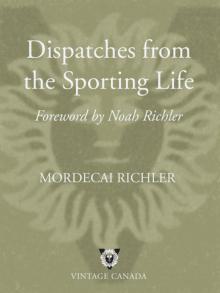 Dispatches From the Sporting Life
Dispatches From the Sporting Life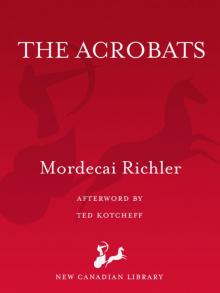 The Acrobats
The Acrobats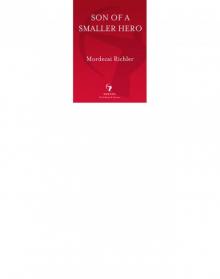 Son of a Smaller Hero
Son of a Smaller Hero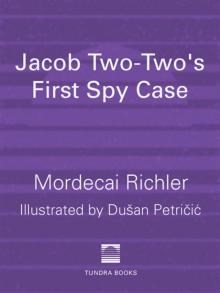 Jacob Two-Two-'S First Spy Case
Jacob Two-Two-'S First Spy Case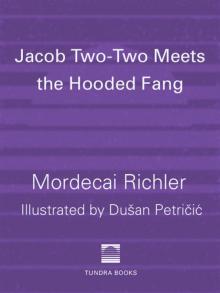 Jacob Two-Two Meets the Hooded Fang
Jacob Two-Two Meets the Hooded Fang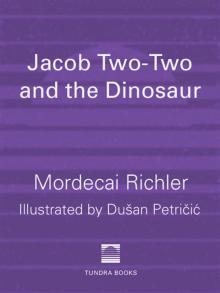 Jacob Two-Two and the Dinosaur
Jacob Two-Two and the Dinosaur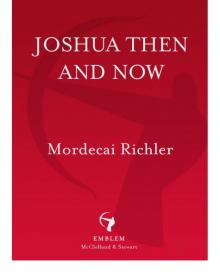 Joshua Then and Now
Joshua Then and Now Solomon Gursky Was Here
Solomon Gursky Was Here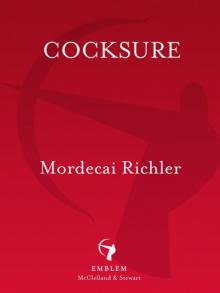 Cocksure
Cocksure The Street
The Street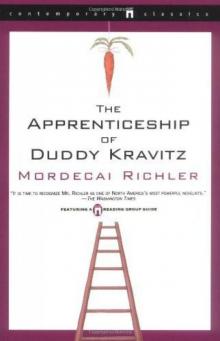 The Apprenticeship of Duddy Kravitz
The Apprenticeship of Duddy Kravitz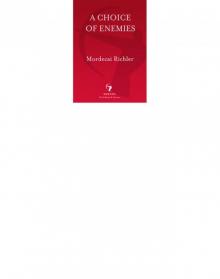 A Choice of Enemies
A Choice of Enemies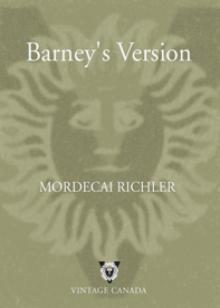 Barney's Version (Movie Tie-In Edition)
Barney's Version (Movie Tie-In Edition)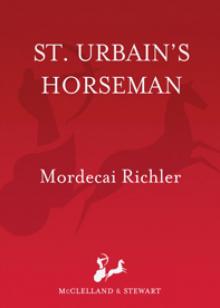 St. Urbain's Horseman
St. Urbain's Horseman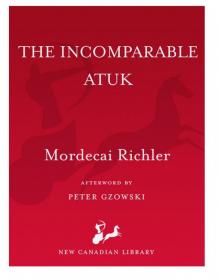 The Incomparable Atuk
The Incomparable Atuk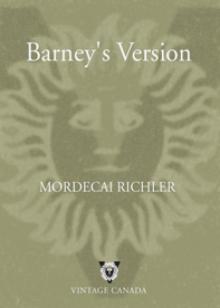 Barney's Version
Barney's Version